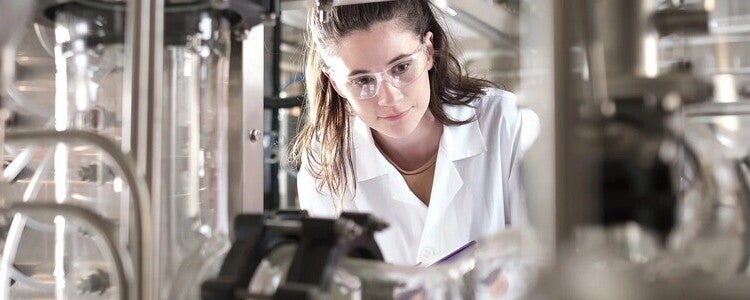Written by special contributor
The future of work is rapidly evolving. Here are six degrees offered at Waterloo that will equip you with the skills employers want and the resilience to adapt to the changing workforce.
1. Climate & Environmental Change
Based on the latest IPCC reports, there's no doubting climate change is real. Global temperatures are increasing, glaciers are melting, and sea levels are rising. The future will demand professionals who understand the impact of climate change on resource availability and scarcity, and who can respond to environmental degradation, mass human migration, and the need to develop sustainable solutions.

Join the movement in Canada's largest Faculty of Environment and discover a rewarding career in sustainability, policy, academia, consultancy, and renewable energy.
New Program Spotlight: Climate & Environmental Change, Bachelor of Science
- Be part of an innovative, first-of-its-kind program in Ontario
- Build up your skills and experience in the environment sector through our world-renowned co-op program
- Tackle the climate crisis by developing a scientific understanding of the climate system and apply your knowledge with computer modelling
Mujtaba (he/him) completed his master's in climate change at Waterloo and now works to help farmers and small businesses in developing countries become successful through sustainable practices and technologies. "We focus on making it easier for women, youth and those in marginalized communities to become leaders in both their communities and environmental practices."
2. Honours Arts and Business
Waterloo Arts graduates are well-positioned for the future workforce as they possess a unique ability to make sense of data and translate it into actionable strategies.
During your studies in Honours Arts and Business, you’ll select one of 30 majors and layer on business classes that will teach you the practical skills employers look for (like analysis, communication and collaboration). You can customize your degree even more with up to 20 months of hands-on experience, building real-world skills and knowledge through co-op.

Recent grad Janneke combined visual culture and business to consider the value of art from social and economic perspectives. Learning across disciplines even helped her uncover a surprise interest in accounting and financial management!
You don’t need a business or finance background – Waterloo really helps build confidence in business.
3. Chemical Engineering
Be at the forefront of sustainable, environmentally friendly, and safe process design by learning to engineer the products we use every day: energy, food, medicine, and so much more.
As a chemical engineer, you’ll design, implement and supervise industrial processes where matter undergoes change — in the pharmaceutical, pulp and paper, food and plastics industries, and more. You’ll also play a major role in the emerging field of nanotechnology, with applications in the development of new materials and devices.

While studying Chemical Engineering at Waterloo, you’ll acquire transferable skills that open a wide range of employment opportunities to support the future’s transition to sustainable energy, minimize pollution, maximize food production, and enhance health care.
Current student, Caitlin (she/her), enjoyed the chance to acquire practical experience in the labs. "Being exposed to concepts through labs allows students the unique opportunity to explore the use of real-world equipment like distillation columns, heat exchangers, and the design of bioreactors, which have a variety of applications in the chemical, petroleum, pharmaceutical, and renewable energy industry."
What’s neat about Chemical Engineering at Waterloo is the opportunity for students to see concepts learned in the classroom modelled on a small scale in a laboratory environment, and then upscaled in the workplace.
4. Kinesiology
Canadians are living longer and have better health care than many other countries in the world. As we move into 2023 and beyond, maintaining health will include increased demand for health services from a wide range of practitioners and through a variety of facilities.

Through your degree in Kinesiology at Waterloo, you'll have classes with Canada’s leading scientists and gain hands-on experiences in state-of-the-art labs.
Kinesiology did a great job teaching me the science and physiology that I needed to successfully apply to and begin my years in medicine. Even more importantly though, it taught me soft skills that have helped me to be a better listener, communicator, and team member in my clinical experiences.
5. Mathematics/Business Administration
As technology becomes more sophisticated and global markets are more active, companies will need to increase their ability to use data to make informed business decisions.

In Mathematics/Business Administration you’ll use your analytical know-how to solve problems in a rapidly changing technological environment. By alternating school terms and paid co-op work terms throughout your degree, you can explore new career areas and different types of employers.
6. Science and Business
Growing sectors such as biotechnology need grads skilled in biology, biochemistry, biomedical sciences, and life physics to help shape products, services, and processes vital to business.

A Science and Business degree from Waterloo allows you to talk science while translating between scientific discovery and business needs: skills that biotechnology, medical device, pharmaceutical, and health firms need to succeed.
Not sure what to study?
Start by learning more about yourself. Do you like English, business, or math courses? Helping people lead healthy lives or developing the latest tech? Take our three-minute quiz to discover what drives you and how your strengths connect to Waterloo programs.
Related articles

How to choose a university program
Choosing a university program can be a daunting task. A big part of that challenge is not knowing what to look for. To make this process slightly easier, here are a few factors to consider when choosing a university program.

What to do when you can't decide
So, you don’t know what you want to do after graduation. The good news is, you’re not alone. If you know that you want to go to university, but you don’t know what you want program to apply to, don’t worry! We’ve got some tips that will help you to consider what your next steps could be.

10 factors to consider when choosing a university
So you’re thinking about going to university. With so many programs and universities, how do you pick? Here are 10 factors to consider.

